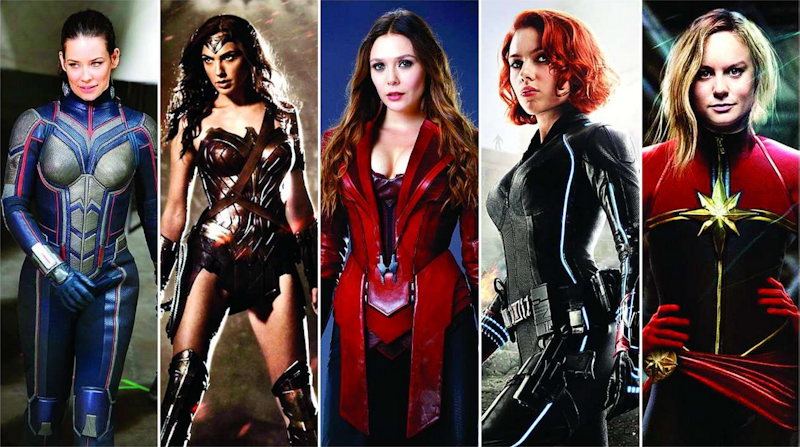Let us not dwell further upon box office failure The Marvels specifically but ask the likelihood of the superhero biz in general righting the ship and winning back audiences—not just in cinemas but in comics shops, and not just Marvel but also rival DC Entertainment, who I’ll revisit in three weeks at the climax of this four-week, four-column, four-franchise attempt to rescue nerdom from its errors (with Star Trek and Star Wars sandwiched in between the two superhero columns).
It may help that circumstances—Covid, audience apathy, corporate mergers, politics, the streaming glut, bad story ideas—have conspired to create a fairly light release schedule for both the big superhero companies in 2024. That may give them time to pause and reflect upon their errors. The real question is whether they’re capable of learning.
One thing that must be creating great tension at both Marvel and DC is that even if they decide to change course drastically—say, by following more of a conventional, semi-serious action-adventure formula (a la 2014’s Captain America: The Winter Soldier) than the recent attempts at frenetic, montage-like quirkiness—wary audiences will not see the results until at least 2025.
Next year’s schedule is largely set and largely unalterable at this late point. And that schedule includes many things that are either quirky or female or both—not that I blame femaleness or diversity per se for the recent quality problems, but the studios must be painfully aware that at least a portion of the audience will see those things as correlated with the recent decline, or at least as poor substitutes for overall quality.
Fresh off the failure of The Marvels, whether you like it or not you’re getting a 2024 in which there are three Sony-produced Marvel movies (usually lamer than the main Disney-produced, Avengers-starring films), beginning with the nearly-all-female and low-budget-looking Madame Web. The prospect of Sony following that up with two manlier but probably comparably lame films, Kraven (about a big game hunter turned assassin turned friend to animals) and Venom 3, doesn’t help restore confidence.
The fourth film with Marvel characters next year, this one a product of Disney’s Marvel Studios proper, Deadpool 3 (teaming the eponymous antihero up at long last with Hugh Jackman’s Wolverine and bringing in many of the past X-Men films’ actors), is still not really an Avengers movie or an Earth-616 movie but more like a final farewell to the Earth/universe on which the Fox-produced Marvel movies occurred before Disney recently absorbed Fox. So, you likely won’t be seeing, say, Capt. America or Doctor Strange next year.
As I said, it’s time off that may allow for contemplation and self-improvement.
Don’t look too intently at Disney+ for signs of improvement, though, as next year on that channel will first bring Marvel’s reportedly-weak miniseries Echo about gangster Kingpin’s morally-gray, deaf, Native-American, uncharismatic gangster-turned-crimefighter niece—because you demanded it, True Believer!
After that gets released all in one day (to avoid a protracted period of negative reviews, most likely), just keep your fingers crossed (or cast spells if you prefer) hoping the witchy, slightly-Avengers-related miniseries Agatha: Darkhold Diaries will be as amusing as star Kathryn Hahn’s facial expressions, which were likely the main inspiration for the series. Then we wait a few months to see how gay and/or trans the revived X-Men animated series has become, not that there’s anything wrong with that.
Meanwhile, over at DC, their sole film next year—since the decade-long experiment known as the DCEU (the interconnected films of the so-called DC Extended Universe, featuring such actors as Henry Cavill) ends this month with Aquaman 2—will be the sequel Joker: Folie a Deux, with Joaquin Phoenix once more playing villainous madman Joker and, despite the current immense popularity of Margot “Barbie” Robbie, Joker’s sidekick now being played by Lady Gaga, as if these studios enjoy not giving you what you expected or wanted, even when you thought you were just aiming for the familiar, satisfying cinematic equivalent of fast food.
On-screen as in print, it’s likely that the shortest route to disaster in superhero fare is using creators who never really liked the source material in the first place, never believed anyone sane could take all this stuff seriously, and thus couldn’t wait more than a film or two before asking how to mix it all up and make it ridiculous, like a stand-up comedian invited to run the opera for one day.
Once in a rare while that works (who doesn’t love the Marx Brothers’ A Night at the Opera?). The rest of the time, audiences aren’t longing for parodies and jackasses, certainly not over and over to the exclusion of the serious source material. They want something far more powerful, emotionally resonant, and above all moral than absurdism—namely heroes, facing convincingly dire challenges and tough choices. If audiences can no longer get that from Marvel or DC, they’ll give up on both those companies and turn to dangerous backstreet substitutes like anime and fan fiction.
Let’s agree to give the Big Two about 18 months to make things right, no more. May we find ourselves in a very different universe by then.
—Todd Seavey is the author of Libertarianism for Beginners and is on X at @ToddSeavey

